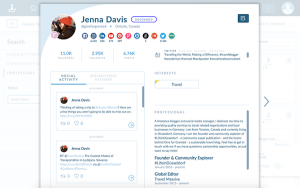Sometime between the advent of the hoverboard and the release of the iPhone 11, the first wave of true digital natives—better known as members of Generation Z (or “Gen Z” for short)—took their first steps into a workforce now trying to navigate the differences between five generations of workers.
Reports suggest that these youngsters, designated by Pew Research Center as those born after 1996, will account for as much as 36% of the U.S. workforce by the end of the year, and if you’re wondering if that will mean anything for you and your remote business, the answer is a resounding yes. Ambitious and tech-brilliant, Gen Zers bring a unique value to the remote workplace—but upon adding a member of Gen Z to the payroll, we are faced with a new challenge: How do we manage and mentor these new professionals in a remote setting?
Here are four of Generation Z’s strongest workplace values and several tactics managers can use to create an environment that fosters success for their Gen Z employees:
1. Communication and Feedback
Naturally, one might assume the preferred method of communication for the generation who grew up often glued to more than one screen at a time would be instant message (IM) or text; in fact, more than 80% of managers who responded to a 2019 ServiceNow survey predicted that IM would be Gen Z’s top choice. But these managers missed an important point: since today’s young adults have been so inundated with technology, they’ve become starved for face-to-face communication. As it turns out, 83% of Gen Zers who spoke with ServiceNow said they would opt for face-to-face interaction with their supervisors if given the choice, according to HR Dive.
So where do we start? With the individual, of course.
Set up one-on-one check-ins
Meet Gen Z’s expressed desire for face-to-face interaction with regular one-on-one video calls to check in. These meetings don’t need to be lengthy—even 15 minutes can go a long way toward helping you connect with your team members, as well as give you the chance to provide them with the specific feedback they crave. Questions you can ask in these meetings include: What is going well? What have you struggled most with this week? What are you looking forward to with this project? Using web-based tools to keep track of goals and progress for each employee can help provide a means for discussion and constructive feedback, as well.
If you don’t have time to meet with your team members in a video chat each week, try regularly touching base with employees using tools like Slack.
Consider in-person annual meetings
Even entirely remote teams can meet in-person once in a while, if desired. Many fully virtual companies have started hosting annual retreats in order to build morale and kick start new initiatives. As Gen Z becomes more of a presence in the digital workplace, this may be an ideal time to start such a tradition.
Try out a virtual workspace
Although they can be pricey, virtual workspaces can help provide a more human connection by creating personalized avatars for employees, which they can use to interact with others “face-to-face” in virtual conference rooms. It may not be truly “in-person,” but tools like these can help to fill some of the gaps. If you aren’t sure whether this type of product is for you, ask for a group demo or a 30-day trial and see how your team responds.
Remember, they’re still learning
Just because Generation Z prefers to speak face-to-face doesn’t mean it’s necessarily their forte. If needed, take some time during meetings or professional development sessions to teach and practice proper professional communication and other soft skills Gen Zers are known to feel they need to work on, like conflict resolution.
2. Mental Health
According to the American Psychological Association, members of Generation Z are more than 25% more likely “to report their mental health as fair or poor,” and “more than nine in 10 Gen Z adults (91 percent) said they have experienced at least one physical or emotional symptom because of stress.” But as business leaders, we can take steps to take some of the weight off.
Emphasize routines
One of the largest sources of stress for remote professionals is a lack of routines and boundaries. Use onboarding sessions to emphasize to new employees how valuable routines can be and explain how to create them, and encourage your remote team members to designate specific “office hours” after which they can log off and put some more “life” in their work-life balance.
Set clear expectations
Few issues cause more stress to employees—especially those new to the workforce—than not understanding their role or assignment. To help, managers should provide specific instructions, hard deadlines, and a safe space for their team members to ask questions. It can also be useful to go through new Gen Z employees’ job descriptions together line-by-line when they first start with the company to clarify any misunderstandings.
Provide help
When deciding on a benefits package to offer employees, consider what each plan offers with regard to mental health services. Your company could also choose to offer access to helpful tools like mindfulness apps and virtual therapy programs.
3. Career Growth
Research shows that Generation Z greatly values opportunities for growth. In a 2018 survey, 95% of Gen Z respondents named career advancement possibilities as one of their top three reasons for selecting an employer, and one in four predicted they would be in management roles within five years after college. It’s clear Gen Zers have big career aspirations—so how can we, as managers, help our team members reach their goals?
Start early and discuss regularly
Begin conversations with Gen Zers about career growth and goals as early as the interview stage, and revisit the topic periodically. If you don’t have time to meet one-on-one, pair new Gen Z team members with mentors who can help guide them in the right direction.
Keep them included
If your company is not fully remote, check that there are processes in place to ensure your remote employees will be informed about advancement and professional development opportunities. Gen Zers value learning and by and large feel they have room for improvement, so providing chances for members of your team to attend industry conferences and live-streaming company-hosted presentations for your remote employees can also be great ways to keep your off-site team members involved.
Allow for leadership opportunities
Encourage Gen Z employees to put their strengths to good use by giving them the opportunity to take on a leadership role, even if it’s a minor one. For instance, a particularly tech-savvy team member could help colleagues hone their skills in a particular computer application or be the designated go-to person for questions about how to use a certain program.
4. Trust and Transparency
In the era of fake news, it’s no surprise that Generation Z values trust and transparency. More than half of Gen Zers in one survey named honesty as the most important quality in a good leader, according to a report from Inc., and that feeling transcends generations. As managers, it should be a priority for us to make our team members feel like we’re on their side. Here’s how:
Exhibit trust-building behaviors
Start your relationship with Gen Zers off strong by not giving them any reason to doubt you. Share exciting and positive information about your company, but also let them know about shortcomings and stumbles—you’re human, after all.
It can also be useful to establish a policy for personal response times; let your team members know when you’ll be online, and how soon they can expect a response outside of office hours, so they know they can depend on you to be reachable.
Ensure transparency
In literal terms, being transparent with your employees could involve being open about your company’s financial situation and ensuring that your annual reports provide accurate information. But day-to-day, show transparency and openness by communicating with your team members about their successes and areas for improvement, providing context when needed to help them better understand their projects and goals, and following through when you make promises. If for some reason you fall short, owning it and apologizing will go a long way toward building back trust with your Gen Z employees.
Final Thoughts
At the end of the day, no matter who you’re working with—whether they’re a Baby Boomer, Gen Zer, or somewhere in between—it’s important to remember that your employees are people. While facts and figures like these can help guide us in the right direction, as managers, it’s important for us to get to know our team members individually so we can help them be as successful as they can be both within our organizations and beyond.
Business & Finance Articles on Business 2 Community
(56)
Report Post




